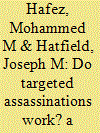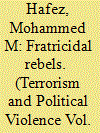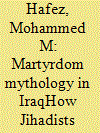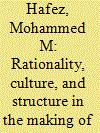|
|
|
Sort Order |
|
|
|
Items / Page
|
|
|
|
|
|
|
| Srl | Item |
| 1 |
ID:
071262


|
|
|
|
|
| Publication |
2006.
|
| Summary/Abstract |
We assess the impact of Israel's targeted assassinations policy on rates of Palestinian violence from September 2000, the beginning of Al-Aqsa uprising, through June 2004. Literature concerning the relationship between repression and rebellion suggests four plausible effects of targeted assassinations on insurgents: deterrence, backlash, disruption, and incapacitation. Using differenced and lagged time-series analysis, this article utilizes multiple and logistic regression to evaluate the effect of targeted assassinations on Palestinian violence. It is concluded that targeted assassinations have no significant impact on rates of Palestinian attacks. Targeted assassinations do not decrease rates of Palestinian violence, nor do they increase them, whether in the short or long run. Targeted assassinations may be useful as a political tool to signal a state's determination to punish terrorists and placate an angry public, but there is little evidence that they actually impact the course of an insurgency.
|
|
|
|
|
|
|
|
|
|
|
|
|
|
|
|
| 2 |
ID:
172193


|
|
|
|
|
| Summary/Abstract |
Why do rebels kill each other? When confronting a formidable regime, rebels often descend into warring factionalism rather than forge unity across their ranks to reap the advantages of cooperation. This article tackles the puzzle of inter-rebel fratricide. It explores power and resource competition arguments, and contrasts them with ideological mechanisms that can drive inter-rebel violence. It argues that ideological extremity is central to rebel fratricide. Rebel organizations with common ideological origins can still compete with each other based on their degree of centrism and extremism, making them ideologically distant. This proximity-distance paradox makes their cohabitation mutually threatening. Ideological challengers from the same family tree are particularly threatening to one’s group cohesion, and if successful, guarantee one’s political marginalization within the broader movement. Extremist groups are likely to respond to these threats with fratricide, while ideologically centrist ones will rely on other strategies such as balancing, outbidding, or defecting to manage their rivalries. Algeria’s civil war, 1992–2002, is a plausibility probe case study that illustrates these causal mechanisms. The study contributes to a burgeoning literature on the role of ideology in armed civil conflicts.
|
|
|
|
|
|
|
|
|
|
|
|
|
|
|
|
| 3 |
ID:
087388


|
|
|
|
|
| Publication |
2009.
|
| Summary/Abstract |
The defeat of Al Qaeda in Iraq may generate new threats associated with the dispersal of its fighters in the region and around the world. Veterans of earlier insurgencies and civil wars in Afghanistan, Bosnia, and Chechnya moved from one conflict zone to another, lending combatants valuable skills and networks of support. The flight of Iraq's irreconcilable insurgents is a greater threat to global security than the one posed by the Arab Afghans because of the range of combat experiences and skills acquired in Iraq since 2003. This manuscript revisits the history of Arab veterans of the anti-Soviet struggle in Afghanistan (1979-1989) to draw out lessons for countering the current bleed out from Iraq. It explores the diverse pathways taken by these "Arab Afghans" and the factors that facilitated different patterns of dispersal around the globe. The article concludes with broad strategic recommendations for counterterrorism measures.
|
|
|
|
|
|
|
|
|
|
|
|
|
|
|
|
| 4 |
ID:
076658


|
|
|
| 5 |
ID:
068586


|
|
|
| 6 |
ID:
169906


|
|
|
|
|
| Summary/Abstract |
Why do Westerners become foreign fighters in civil conflicts? We explore this question through original data collection on German foreign fighters in Syria and Iraq, and test three sets of hypotheses that revolve around socioeconomic integration, online radicalization, and social network mobilization. We conduct link analysis to map the network of German foreign fighters prior to their mobilization, and marshal evidence to assess the validity of competing explanations. We find only modest support for the integration deficit hypothesis, and meager support for the social media radicalization theory. Instead, the preponderance of evidence suggests that interpersonal ties largely drive the German foreign fighter phenomenon. Recruitment featured clustered mobilization and bloc recruitment within interconnected radical milieus, leading us to conclude that peer-to-peer networks are the most important mobilization factor for German foreign fighters.
|
|
|
|
|
|
|
|
|
|
|
|
|
|
|
|
| 7 |
ID:
073766


|
|
|
|
|
| Publication |
2006.
|
| Summary/Abstract |
This preliminary assessment of suicide terrorism in Iraq sheds light on why some groups in the insurgency employ suicide attacks although others do not. The unequal utilization of suicide bombings corresponds to divergent strategies in the insurgency. Some groups fight to achieve system reintegration, whereas others send suicide bombers to collapse the emerging political order. Quantitative data and documentary evidence substantiate the finding that suicide terrorism is carried out by groups that cannot compete in any future political and institutional alignments in Iraq's new coalition politics. Suicide terrorism is intended to produce system collapse, sectarian warfare, and a failed state.
|
|
|
|
|
|
|
|
|
|
|
|
|
|
|
|
| 8 |
ID:
049542


|
|
|
|
|
| Publication |
Boulder, Lynne Rienner Publishers, 2003.
|
| Description |
xvii, 253p.
|
| Standard Number |
1588261247
|
|
|
|
|
|
|
|
|
|
|
|
Copies: C:1/I:0,R:0,Q:0
Circulation
| Accession# | Call# | Current Location | Status | Policy | Location |
| 046493 | 305.697/HAF 046493 | Main | On Shelf | General | |
|
|
|
|
|
|
|
|
|